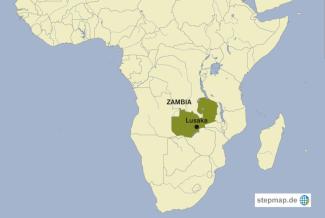Environment
Tribal leaders disagree on copper mine

While some tribal leaders in Zambia align themselves with the developers, saying the project will bring much-needed jobs and prosperity, others support tour operators and environmental activists, who say the mine will pollute the environment and damage wildlife.
The controversial Kangaluwi mining project – in the Lower Zambezi National Park, which lies on the north side of the Zambezi River – recently won a go-ahead from Zambia’s High Court.
The project’s licensee, Mwembeshi Resources Ltd. and its owner, Dubai-based Grand Resources Ltd, could soon start clearing land at the site, which lies between two seasonal rivers that flow into the Zambezi.
Now, tribal leaders are joining the debate, on both sides of the issue. Chieftainess Chiawa of the Goba people in Kafue district – to the west of the mine – raised objections. “What will happen to all those animals when mining starts with all its noise?”, she asked. “I am really scared.” She notes that the Lower Zambezi valley provides a critical biodiversity link between animals in the Kafue and the Luangwa valleys.
However, Chief Mburuma of the Nsenga-Luzi speaking people in Luangwa district said the court should hold the project’s opponents in contempt. “The mine is in my chiefdom and we in Luangwa District are the people that need to be asked first,” he said. “I condemn certain chiefs who say this mine should not go ahead. It’s not in their chiefdom.”
The Kafue district “is far away from the mine,” he told journalists. “People in my district want the mine. We have no jobs here, due to lack of economic activities.”
Similarly another tribal leader, Chief Mpuka of Luangwa district, said the proposed mine will create much-needed jobs. He added that tour operators – the major opponents of the mine – are the ones responsible for depleting animal herds in the park.
“They are airlifting the animals to other places that we don’t know,” Chief Mpuka said. “Most of the species, especially in the feline family, are depleted in this area. Where you find the animals is in Kafue, not here. So which animals are they protecting?”
Unemployed young people also support the project. “We welcome it, as it will be a source of alternative income for the people here in Luangwa district,” said Wisdom Mpundu, a 25-year-old youth of the Luangwa district. “The only usual source of income we have here is fishing, but the fish are being depleted and this problem is growing.”
Another youth, Moses Nkumbu, agreed that the government should not listen to the mine’s opponents. And Pauline Kalasa, also a young person in Luangwa, said many people will benefit from the mine project. “Look at the north-western and Copperbelt provinces, they are developed because of mining,” she said. “This is why we want the mine to come here.”
Environmentalists and tour operators argued unsuccessfully in court that the proposed mining operation threatens the park’s wildlife and environment.
Speaking with opponents of the mine before the high court decision, Ronald Chitotela, Minister of Tourism since July 2019, said the court should keep environmental concerns in mind when deciding on the appeal filed against the mine permit.
Noah Chongo, national coordinator of the Zambia Community Based Natural Resources Management Forum, an organisation launched by the former Tourism Ministry, said the government should revoke the mining license to protect the park and its wildlife.
Derrick Silimina is a freelance journalist based in Lusaka, Zambia. He focuses on Zambian agriculture and sustainability issues.
derricksilimina@gmail.com
















